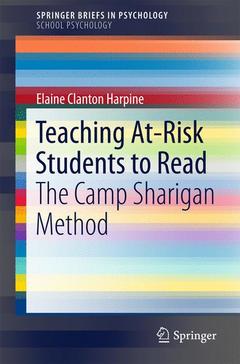Teaching At-Risk Students to Read , 1st ed. 2016 The Camp Sharigan Method SpringerBriefs in School Psychology Series
Auteur : Clanton Harpine Elaine

- Vowel clustering and its use in improving phonemic awareness.
- Why group-centered prevention is better for teaching.
- The importance of cohesion and cohesive-learning in group-centered prevention.
- The use of individualized rotation to increase motivation and instruction in children who struggle to read.
Describes theoretical foundations and practical applications of the Camp Sharigan reading program
Examines serious, stigmatizing academic and mental health consequences of reading failure on children
Explores how Camp Sharigan helps students rebuild self-efficacy and overcome reading failure
Details how group-centered practice strengthens education and mental health outcomes
Demonstrates creative-art therapy techniques
Includes supplementary material: sn.pub/extras
Date de parution : 12-2016
Ouvrage de 48 p.
15.5x23.5 cm
Thèmes de Teaching At-Risk Students to Read :
Mots-clés :
Academic success and reading; At-risk students and reading; Creative-art therapy and reading; Effective teaching methods in reading; Group counseling with children; Group-centered prevention and reading; Motivation and reading; Reading and drop-out prevention; Reading failure and Camp Sharigan; Reading failure and mental health outcomes; School engagement and reading; School-based reading programs; Self-efficacy and reading; Tutoring and at-risk students; Workstations and at-risk students



